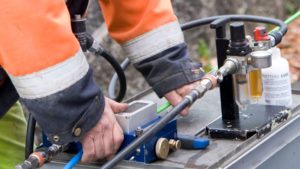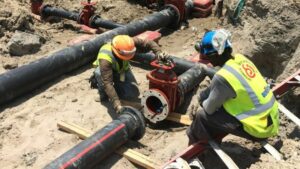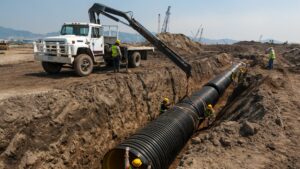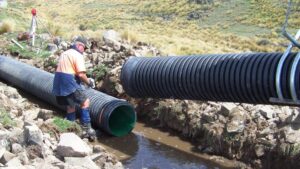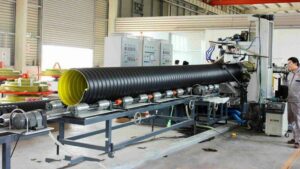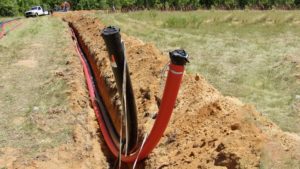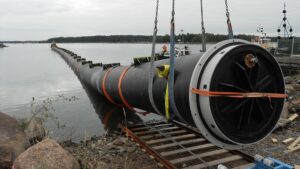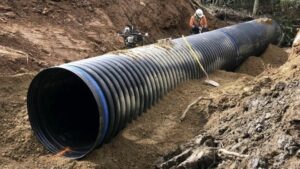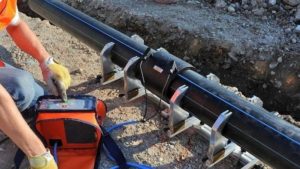When handling pipe and other materials, wear adequate personal protective equipment. Personal protective equipment such as hard hats and steel-toed safety shoes, gloves and safety glasses helps to prevent injuries during product handling. Hard hats shall always be worn when loading, unloading or handling PE pipe and fittings.
Hard hats not only protect your head, but also give motorists and equipment operators an eye-level warning of your presence. As a general rule, steel-toed safety shoes should be worn at all times. They are especially important if there is any possibility that falling objects could land on your feet.
Eye protection shall be worn at all times, especially when operating cutting and joining equipment. Protective eyewear shall meet minimum requirements of ANSI Z87.1. Work gloves help prevent cuts and bruises from sharp or rough edges on pipe, fusion equipment and other objects.
When moving or lifting boxes, pipe drums and other heavy items, place your hands carefully to avoid getting them pinched or caught. Never place your hands inside of the pipe during handling. Tag lines and pipe handling tools allow workers to control the attitude of pipe during handling in a “hands off” handling procedure.
Long-sleeved shirts and trousers or coveralls minimize cuts, bruises and abrasions while also protecting against sunburn and/or poison ivy. Wear high-visibility vests when working at or near a public street or highway or when working at night. This reduces your chance of being hit by a vehicle, or equipment while on the job site.
Job Site Safety
Numerous hazards exist on every job site. While no summary of safe working practices can cover all aspects of safety, there are a number of important guidelines that should always be followed. Before work begins potential hazards should be identified. Check the work site for hazards created by unguarded machinery, chemicals fumes or gases, fuels, heat sources, excessive noise, nearby equipment, buried pipes and /or power lines.
Many hazards are difficult to identify. Materials, equipment, and the work environment should all be considered. Specific plans should be made to minimize such hazards. Documenting these plans and posting them in a public place may be beneficial to those involved in the operations.
Field personnel should avoid working alone or arrange for periodic safety contacts. So that if you are injured, a co-worker can assist you or call for emergency medical service. Polyethylene piping systems commonly require the use of heat fusion equipment. Before the first fusion, the work crew should establish safety procedures for working around the fusion machine.
The procedures may include proper hand signals to be used when hauling, lifting or moving pipe and machinery. Heater plates can reach temperatures in excess of 400°F. Caution should be used to prevent burns. Clothing made of synthetic materials should be avoided when working near any fusion machine.
These materials will melt if contact is made with the heater plate and will stick to the skin, potentially causing severe burns. Around the fusion machine, watch out for pinch points on rotating machinery and sharp edges on the trimmer blades. Remove any loose clothing or dangling straps that may get caught in the equipment.
Never remove guards from the fusion machines as they are designed to protect the operator and others on the job site. Before entering a confined area of trench, make sure that proper shoring and
timbering is in place in compliance to OSHA and industry standards. Proper entry procedures should be followed and a confined space permit may be required.
Monitor trench environment for presence of harmful gases before entry and while working. Establish the location of fire equipment. When using a portable heater in a joining shelter, have an adequately sized Class ABC fire extinguisher on hand.
Always keep flammable liquids such as gasoline and isopropyl alcohol stored in approved containers and away from any open flames and other hot surfaces such as heater plates. Most fusion equipment is not explosion proof and sparks may be generated in motors or during machinery operations.
Preparation and training are essential to any job. Each worker should know what steps to take in the event of an emergency. Field personnel should have an understanding of basic first aid and CPR. Each worker should know the location of the nearest phone as well as the phone numbers for the local police, fire and EMS departments.
If a worker is injured, medical attention and first aid should be sought immediately. Read Full PDF


